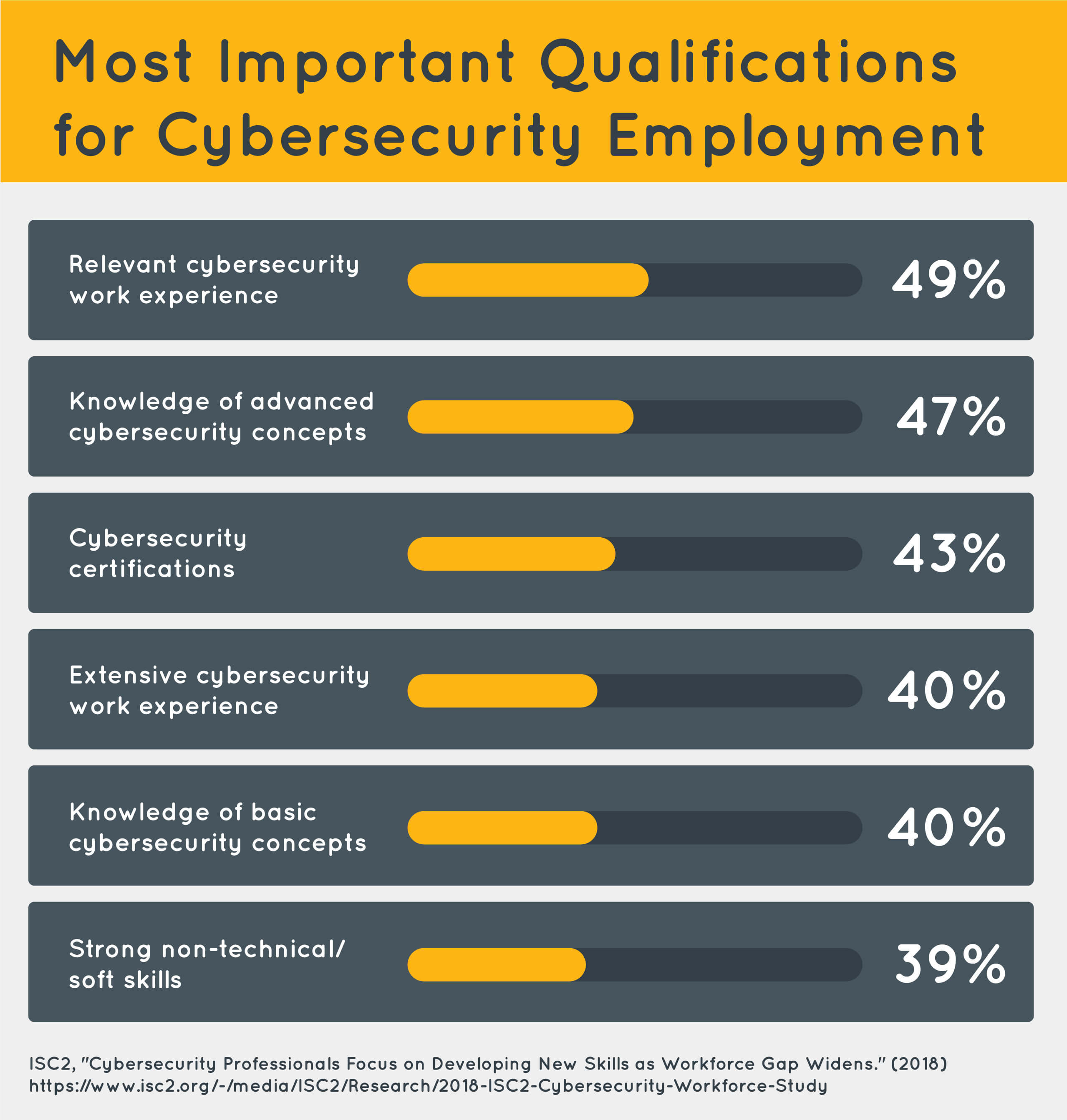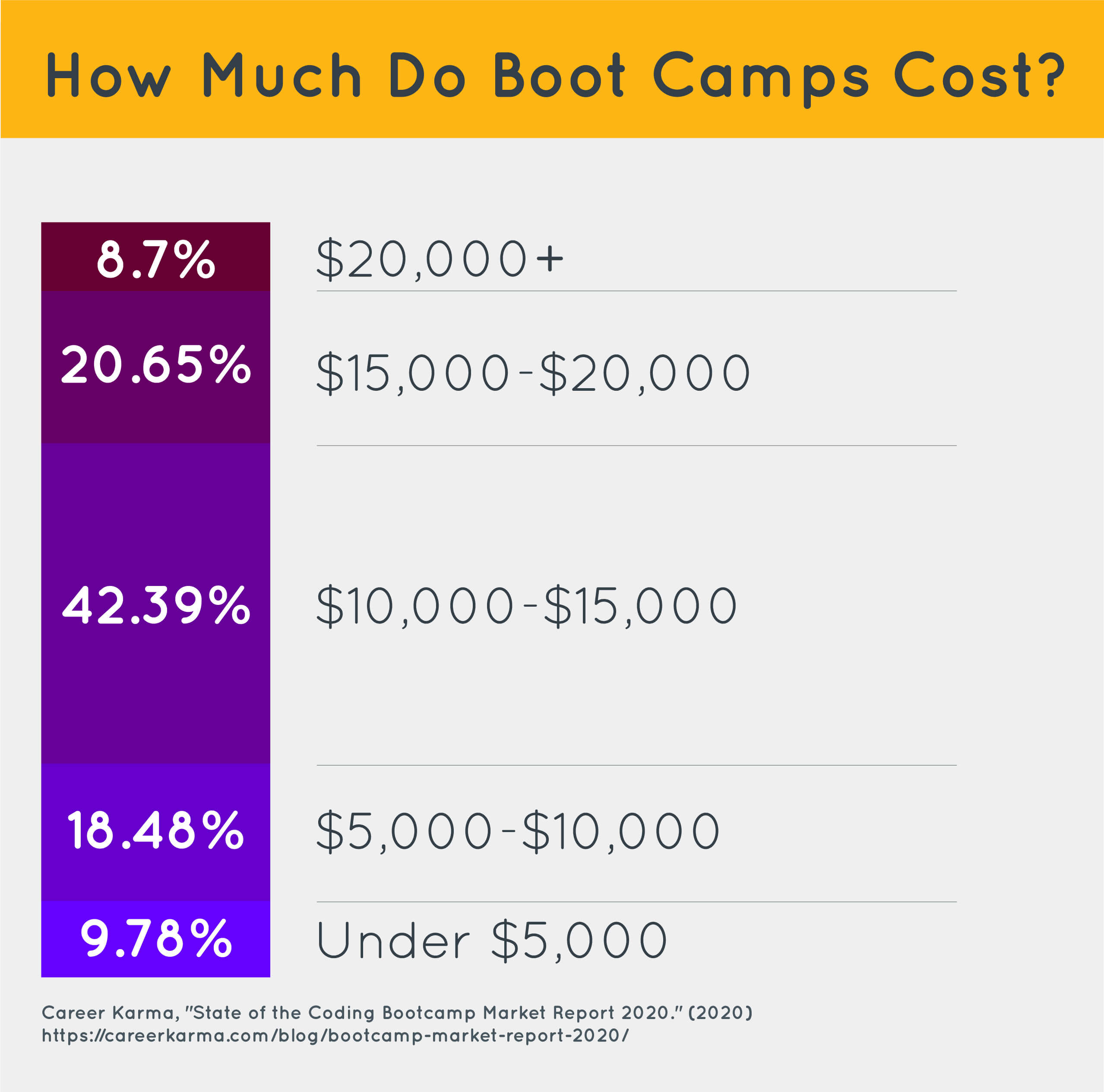Are Cybersecurity Boot Camps Worth It?

Boot camps. No, the ones we’re thinking of don’t have anything to do with camouflage fatigues or 6 a.m. pushups — yet they are designed to get you into fighting shape within a few short weeks.
The boot camps we’re focused on are all about learning industry-grade cybersecurity skills through comprehensive coursework. Over the past few years, boot camps have risen to prominence as a quick means to obtain a quality education. They’re short, flexible, and affordable, offering learners the opportunity to develop marketable, in-demand skills within a brief span of about six months.
If you’re prone to skepticism, you may be asking something along the lines of, Are cybersecurity boot camps worth it? More importantly, Are cybersecurity boot camps worth the money required to attend?
The questions seem reasonable. After all, boot camps have an almost-too-good-to-be-true elevator pitch; they promise to prepare aspiring (but inexperienced) cyber professionals for an entry-level industry role within a few short months. But do the programs hold up to the hype?
Let’s assess.
How Are Cybersecurity Boot Camps Run?
While there are many types of boot camps out there, cybersecurity programs are typically designed to prepare you for entry-level cybersecurity jobs. These programs often accept students of all experience levels but are usually geared towards self-taught techies, new graduates, or mid-level IT professionals looking to make a career switch.
Programs can range in duration from three to six months, depending on the topics covered and the learner’s schedule. Many are offered with flexible scheduling in mind and provide full-time, part-time, in-person, or virtual learning environments.
Usually, curricula are designed by security experts with more than a decade of experience in the field; cybersecurity boot camps expose students to the latest security tools, technologies, and protocols at a relatively low cost.
What Skill Level Is Required?
The prerequisite knowledge you’ll need depends on the program you choose.
Many cybersecurity boot camps are aimed at absolute beginners — i.e., those with no knowledge concerning networking, IT, or operating systems. A high school diploma may be the only educational requirement.
However, beginners will need to be a little more discerning about the program they choose. Given the curriculum, will you be able to master the coursework capably enough to land a job following graduation? Will you need to take some time before the course to prepare for the lectures and assignments you’ll receive during?
Depending on the boot camp at hand, it may be helpful for beginner students to take a few foundational courses on coding and security. That said, doing so is usually not required for beginner-friendly programs.
However, there are also intermediate programs geared toward those familiar with IT fundamentals. For these, prerequisite competencies could include prior networking certifications, familiarity with computer architecture, and several years of career IT experience.
Boot camps geared toward more advanced students cover the most tricky concepts: penetration testing, application security testing, and ethical hacking are all common course materials. Advanced candidates may attend these mid-level boot camps to master highly-specialized skills.
Additional Resources:
- The Beginner’s Guide to Cybersecurity — UT Austin Boot Camps
- Cybersecurity for Beginners — Raef Meeuswisse
- The Basics of Hacking and Penetration Testing: Ethical Hacking and Penetration Testing Made Easy — Patrick Engebretson
- Hacking For Dummies — Kevin Beaver
Are There Any Admissions Requirements?
Cybersecurity boot camps aren’t beholden to any national or state-wide regulations concerning educational requirements. However, as mentioned previously, some higher-level programs have a higher bar for admissions than those catering to beginners. Boot camps may assign skills tests, ask you to complete a security challenge, or require you to undergo an interview before enrolling.
You may also need a college degree in a relevant field (computer science or IT) or a baseline certification for these more advanced programs.
In short, specific admission requirements will vary depending on the boot camp — so do your research before applying!
How Popular Are Boot Camps?
As of late, boot camps have exploded in popularity. While the growth is centered primarily in coding, programs focused on digital marketing, UX (user experience) design, and — of course — cybersecurity have also seen increased activity.
According to Verified Market Research, the global coding boot camp market was valued at $399.91 million in 2018 and is projected to reach $889.37 million by 2026. That represents a remarkable compound annual growth rate (CAGR) of 10.70 percent over the projected period.
As of the summer of 2019, boot camp courses were available in 71 US cities, 38 states, and 14 were offered entirely online. In 2019 alone, 33,959 learners graduated from boot camp programs.

Students and companies are both increasingly recognizing boot camp programs as a valuable avenue for education. They offer one of the most popular, affordable, and flexible means for working professionals to upskill.
What They’ll Teach You
Are cybersecurity boot camps worth it? To answer that question well, we’ll have to turn our discussion to what these courses cover.
Most cybersecurity programs emphasize the importance of hands-on learning and exploration. You’ll be prompted to work on labs, complete assignments, and troubleshoot through security problems.
Coursework will differ depending on what type of student the course is geared toward. Most beginner courses will focus on broad-strokes concepts like maintaining computer systems, system administration, the foundations of networking, the Linux OS, and the Windows server.
Intermediate courses are geared toward those with preexisting IT experience; thus, their curricula can encompass a wide variety of topics. SIEM administration, ethical hacking, incident response, and security auditing are all popular topics within this category.
Finally, advanced boot camps — such as those geared toward specialized topics like penetration testing — may focus on advanced infrastructure attacks, Python programming for security, and wireless penetration testing techniques.
Frequently Taught Skills:
- Security fundamentals
- Threats and vulnerabilities
- Cryptography
- Computer forensics
- Network defense and security
- Python for programming
- Preparation for certification (commonly Security+ or CompTIA+)
- Career building and interpersonal networking
It’s important to reiterate that many programs could require at least a year or two of IT or development experience. Some intermediate and advanced boot camps want their applicants to be proficient in scripting languages such as JavaScript, Python, Perl, and Ruby.
No matter what course you choose, we recommend that you familiarize yourself with standard operating systems like Linux and Windows. Many entering the field have a bachelor’s degree in programming, computer engineering, computer science, or have otherwise received networking certifications.
According to a 2018 report from (ISC)2 (PDF, 1 MB), hiring managers view cybersecurity qualifications as one of the most important factors during the candidate hiring process, second only to relevant work experience and knowledge of advanced cybersecurity concepts.

What Certifications Should I Take After a Cybersecurity Boot Camp?
In addition to pursuing a boot camp, we recommend that those seriously interested in cybersecurity achieve one or more common certifications. Certifications are a helpful way for employers to gauge how much you know.
The most popular certificates currently on the market include:
- Certified Information System Security Professional (CISSP)
- Certified Information Systems Auditor (CISA)
- Certified Information Security Manager (CISM)
- CompTIA Security+
Ultimately, boot camps can take you 90 percent of the way to a career in cybersecurity — but you’ll want to take a few additional measures to stand out to hiring managers.
Do Employers Take Graduates Seriously?
Yes, yes, yes. Employers are very much willing to consider boot camp graduates for entry-level roles.
Currently, employers are facing an overwhelming need for fresh talent. All companies that store data need to onboard cybersecurity staff to stay ahead of digital threats.
According to Emsi research (PDF, 1.6 MB), employers in the US have less than half of the cybersecurity candidates they need to keep up with demand. Right now, there are just 48 qualified candidates for every 100 cybersecurity job postings. It would take a 145 percent increase in the current cybersecurity workforce to meet global demand.
Burning Glass further reports (PDF, 3.5 MB) that the number of cybersecurity job postings has grown 94 percent since 2013, compared to merely 30 percent for IT positions overall. That’s over three times faster than the job growth rate for the IT sector
The researchers for Emsi’s report strongly advocate for boot camps as a solution to the lack of qualified personnel.
“We observe that most current cybersecurity experts have a bachelor’s and even master’s degree. But that doesn’t mean new cybersecurity recruits from other fields should go back to school for another four years. Instead, short, targeted programs can build on the education and work experience they already have…boot camps offer significant possible savings for employers who pay to upskill current employees rather than slogging through layoff-and-hire cycles.”
In short, employers are desperate. If boot camps can supply these highly-qualified individuals, employers will take them. It’s that simple.
Researchers for Indeed agree, reporting that 99.8 percent of surveyed hiring managers who have hired boot camp grads would do so again. Additionally, 72 percent of surveyed employers think boot camp grads are “just as prepared and likely to be high performers” as candidates with traditional degrees.
So, are cybersecurity boot camps worth it? From an employment perspective, they certainly are. With the proper discipline and passion, you can reap the rewards of all those long nights spent studying.
Now, we need to move on to cost — are cybersecurity boot camps worth the money? The answer to that question relies, in part, on a cost-benefit analysis.
How Much Do Cybersecurity Boot Camps Cost?
How much can a learner expect to pay for a cybersecurity boot camp? Emsi researchers estimate that students invest between $5,000 to $20,000 (PDF, 1.6 MB). While there isn’t all that much data to look at cost trends for cyber programs in particular, we can assess coding boot camp pricing more generally to provide insight.
Career Karma offers this breakdown of boot camp tuition trends, with 42 percent of programs charging between $10,000 and $15,000.

While lower prices might be more enticing, always make sure you’re investing in a course that offers high-quality instructional content.
A boot camp’s cost can be a good (albeit unidimensional) indicator of the quality of materials, instructors, labs, and education length. When evaluating a boot camp, make sure to ask these questions:
- Will I have access to real-time interaction with the instructor? How frequently?
- Am I going to learn the latest technologies and frameworks, or is the course missing something important?
- Are the boot camp projects good enough to place on my resume? Do the projects mimic real-world experience?
- Will I receive career planning support upon graduation? What type of career support tools will best suit me (portfolio reviews, tech interview training, one-on-one career coaching, or live office hours)?
- What financing options are available for a boot camp? Do they seem fair? Is the program transparent about how costs are structured?
- Does the boot camp offer a “trial” period wherein I can withdraw and recoup costs?
What You Might Earn as a Cybersecurity Professional
Given the investment associated with a boot camp education, are cybersecurity boot camps worth the money?
The answer is, emphatically, yes. The average cybersecurity professional’s salary far outweighs the amount you would invest in a typical boot camp. That education represents a small investment in your future to support significant returns down the line.
We should note that it’s challenging to determine an industry-wide salary average for cybersecurity professionals since the field is so expansive. Instead, we’ll provide you with a variety of salary ranges for the jobs you’ll likely seek out after completing a boot camp (and getting the right certifications).
The following salaries equate to what professionals with zero to five years experience make on average.
- IT Security Analyst: $59,000 – $67,000
- Cyber Security Analyst: $62,000 – $71,000
- IT Security Architect: $79,000 – $94,000
That said, current or potential boot camp students should keep in mind that the numbers shared here are estimates, not guarantees. Your final salary will depend on a variety of factors, including location (e.g., a business in the rural Midwest will probably pay less than a firm in New York City), your employer’s budget, and your prior experience.
Sure, paying for a boot camp can be intimidating — but in most cases, the payoff is well worth the investment.
Final Thoughts: Are Cybersecurity Boot Camps Worth the Money?
The answer is a resounding yes. Cybersecurity boot camps equip students with the most in-demand skills that are immediately transferable to the working world. Employers are increasingly turning to boot camp grads as a reliable source of talent, and the vast majority that have hired a boot camp grad would do so again.
If you have a genuine interest in the world of tech, why not consider a career in cybersecurity? Consider your options and start researching cybersecurity boot camps today!

 Live Chat
Live Chat